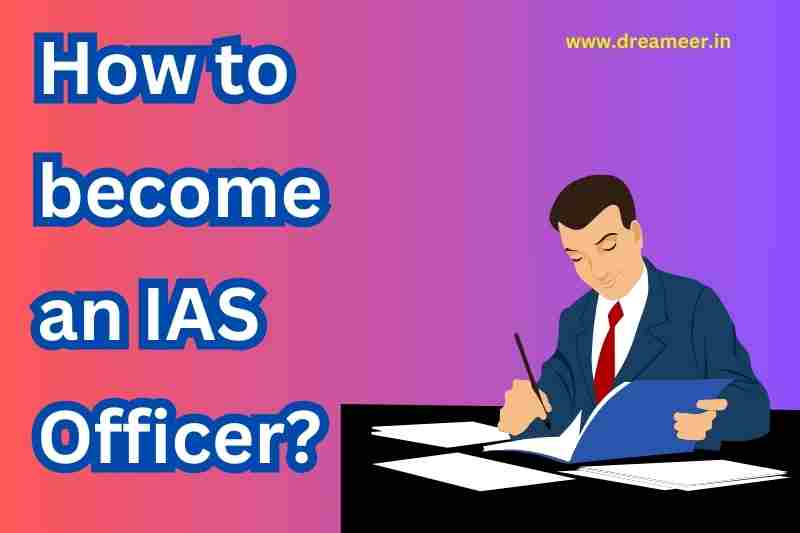
How to become an IAS Officer?
IAS is the premier and very challenging civil service of India. Its officers have to clear the UPSC Civil Services Examination for training at the Lal Bahadur Shastri National Academy of Administration in Mussoorie. Candidates must be a graduate and are required to be 21-32 years of age as on August 1st of the exam year.
What is an IAS officer?
IAS officers are high-ranking civil servants in India and are primarily responsible for the independent and effective execution of government policies and programs. There is a huge scope of jobs for any IAS officer, ranging from policy formulation and implementation to public service delivery. IAS officers are primarily known for integrity, leadership, and utmost dedication towards public welfare. Their work involves aspects of administration monitoring development activities and maintaining law and order. To become an IAS officer, a candidate must clear a competitive examination and go for extensive training program. The officers establish a link between the government and the countrymen and work tirelessly to bring great societal reforms.
You may Like to Read these Article
For expert guidance and assistance in choosing a College or a Career after Class XII, Contact Dreameer Edu
Roles of an IAS Officer
- Managing Law and Order: This means maintaining peace and harmony in their area of work by upholding the glorious tradition of the police service.
- Policy Implementation: These officers help in implementing various government policies at the ground level.
- General Administration: IAS officers perform administrative responsibilities at many levels.
- Feedback and Reporting: The feedback of IAS officers governs the policies implemented by their respective ministries.
- Leadership and Integrity: IAS officers are undoubtedly recognized as the epitome of administrative skills and integrity, which helps them survive amid complex bureaucratic systems.
For expert guidance and assistance in pursuing a Career, Contact Dreameer Education today!
Eligibility to become an IAS Officer
| Age limit | The minimum age to appear for the UPSC CSE exam is 21 years. The maximum age limit to become an IAS officer for general category candidates is 32 years. For OBCs it is 35 years, and for SC/ST the upper age limit is 37 years. |
| Educational qualifications | Must pass the UPSC CSE exam and have a graduation degree from a recognized university. Graduation final year candidates and distance/online learning individuals can appear for the exam.Chartered accountants or other financial accounts from ICWAI or ICSI-registered organizations are also eligible. |
| No. Of attempts | For general category candidates, 6 attempts are allowed.For OBC candidates, it is 9 attempts.There is no age restriction for SC/ST candidates up to 37 years. |
Skills required to become an IAS Officer
- Patriotism: An IAS officer must be whole-heartedly committed to serving his country.
- Legal and rational approach: There is a basic legal compliance with accuracy.
- Responsibility and accountability: Everyday administrative work requires a diligent approach.
- Hard work and commitment: To some extent, the wide range of duties of an IAS officer requires hard work and utmost dedication.
- Effective communication: IAS officers must be endowed with good communication skills.
- Leadership: To lead by example and motivate others.
- Emotional intelligence: Intelligence of emotions and emotional regulation will help in making better decisions in uncertain situations with community interests at stake.
- Honesty and integrity: Any violation of the code of conduct is unacceptable.
- Adaptability: The dynamic nature of administrative work demands flexibility and adaptability.
- Knowledge: For effective decision making, knowledge on current events, policies and principles of governance is important.
How to become an IAS Officer?
Step 1: Choose the right undergraduate course
After students complete their 12th class, they should consider the options for the base academic program very carefully. This course should ideally be included in the UPSC exam syllabus. These subjects include history, public administration, economics, political science, and sociology; these can prove to be a driving factor in your preparation. It is also important to note that the degree and specialization taken for this course can affect graduate civil service opportunities to a great extent, so a wise decision will go a long way.
Step 2: Complete your undergraduate degree
A bachelor’s degree from a recognized institution is required to work towards a professional career. Such an undertaking will provide you with sufficient knowledge and skills to carry out your job duties. However, there is no restriction after obtaining a bachelor’s degree; neither is it a measure of job preparation. A postgraduate degree can help enhance your knowledge and maximize expertise; however, it is not mandatory. It largely depends on your ambition and aspirations.
Step 3: Start preparing for the UPSC exam
Now we are ready for another important step: beginning the UPSC exam preparation. The UPSC exam is divided into three stages: prelims, mains and interview. It tests the candidates’ knowledge about current affairs, history, geography, politics and aptitude. Newspapers and books and coaching can help in preparation.
Step 4: Choose the optional subject wisely
The UPSC Mains exam consists of a total of 9 papers, out of which Paper VI and VII are optional. Candidates have to choose an optional subject from the list of 48 subjects prepared by the UPSC. Since the marks obtained in the mains exam are considered for the final merit, this is a decision that a candidate should never take lightly.
Step 5: Apply for the UPSC exam
After successfully completing the preparation and being confident about the knowledge and skills, one can apply for the UPSC exam. The application is a straightforward process- filling an online form with the prescribed fee on the official UPSC website, from anywhere and at any time.
Step 6: Clear the UPSC exam
Looking towards the future, the main stage will come which will require preparation to clear the UPSC exam. Although the exam is tough and requires a lot of hard work and dedication, it can be cleared with determination and commitment. Once you pass, a lot of doors open up before you, including the chance to become an IAS officer. So let us stay motivated through all the ups and downs of the humble journey to reach our destination.
For expert guidance and assistance in pursuing a Career, Contact Dreameer Education today!
What to study to become an IAS Officer?
| Subjects | Chapter | Books |
| Economy | Economy | Indian Economy – by Nitin Singhania and Ramesh Singh.Indian Economy Key Concepts – by Sankarganesh Karuppiah. |
| History and Indian culture | Modern Indian History Ancient &Medieval India Indian Culture | Poonam Dalal Dahiya Art and Culture by Nitin Singhania. |
| Science & Tech | Science & Tech | Ravi P. Agrahari |
| Geography | Indian geography and world | Certificate in Physical and Human Geography by Goh Cheng Leong.Geography of India – by Majid Husain.Oxford Student Atlas for India. |
| Current Affairs | Daily, Monthly & Weekly Current Affairs | India 2022 Yearbook by Rajiv Mehrishi.The Malayala Manorama English Yearbook 2022 by Mammen Mathew. |
Best Courses to become IAS Officer
| Course name | Admission Criteria | Entrance Exam |
| Bachelor of arts | Merit & Entrance exam | DSAT IPU CET BHU UET JNUEE NPAT |
| Bachelor’s Business administration | Merit & Entrance exam | IPU CET DU JAT |
| Masters of arts | Entrance exam and Direct Admission | TISSNET PU |
| Master’s of business administration | Entrance exams GDPI Round | CMAT CAT MAT SNAP |
FAQs on How to Become an IAS Officer
Ques: Can I become an IAS officer without graduating in a specific field?
Answer: Yes. Anyone who has graduated from any subject can become an IAS officer, provided his/her university is recognized. There is no compulsion about the specific field of study; thus, degree holders in engineering, science, commerce, arts or humanities can appear for the IAS exam.
Ques: How many attempts can a candidate take to pass the civil services exam?
Answer: Currently a candidate is allowed a limited number of attempts for the civil services exam. General category candidates can appear for the exam six times, while OBC candidates are allowed nine attempts. SC/ST candidates can appear for the exam indefinitely, provided all other criteria including age limit and educational qualification are met.
Ques: Is it necessary to get coaching to pass the civil services exam?
Answer: Coaching is not mandatory to pass the exam, but it is beneficial. Most candidates for civil services exams take coaching because of guidance, study material, and mock tests. On the contrary, self-study and discipline have a major role to play which is a key factor in achieving success in the exams. Candidates who want to study on their own must be self-motivated and committed to the goal. Set a feasible timetable and stick to it, as the syllabus to be covered for the exam is huge.
Ques: Is there any age limit to appear in the Civil Services Exam?
Answer: Yes, there is definitely an age limit to appear in the Civil Services Exam. The age of the candidate should be between 21 to 32 years as on 1st August of the exam year. But there are some categories, their age will be relaxed to some extent (5 years for SC/ST candidates, 3 years for OBC candidates and 10 years for physically handicapped candidates). Apart from this, candidates have to fulfil the age criteria to appear in the exam.
Ques: Will I be allowed to choose any optional subject for the main exam?
Answer: Well, it is the candidate’s right to choose an optional subject for the main exam. But he has to choose the subject according to his aptitude and interest. There are many subjects like History, Geography, Political Science, Economics, Literature etc. Candidates should choose their optional papers wisely, as these have a weightage of 500 marks in the main exam, and it is really important that candidates prepare a successful strategy to make the most of them.
You may Like to Read these Article
For expert guidance and assistance in pursuing a Career, Contact Dreameer Education today!

